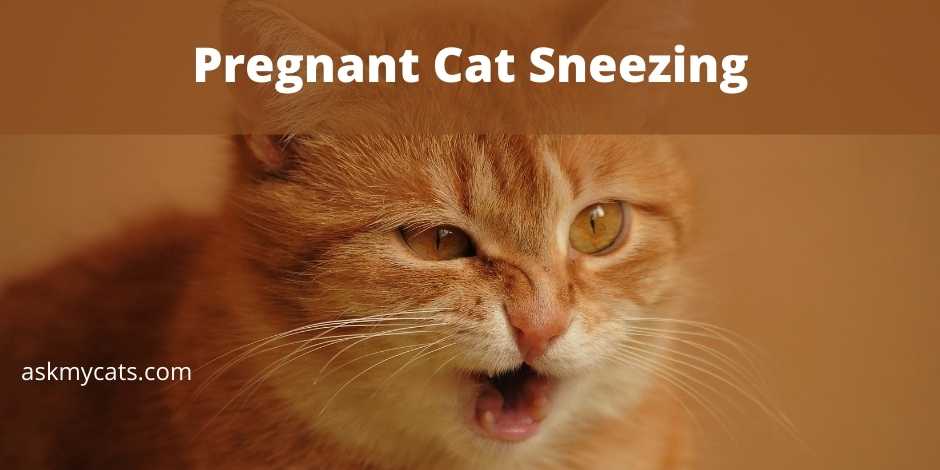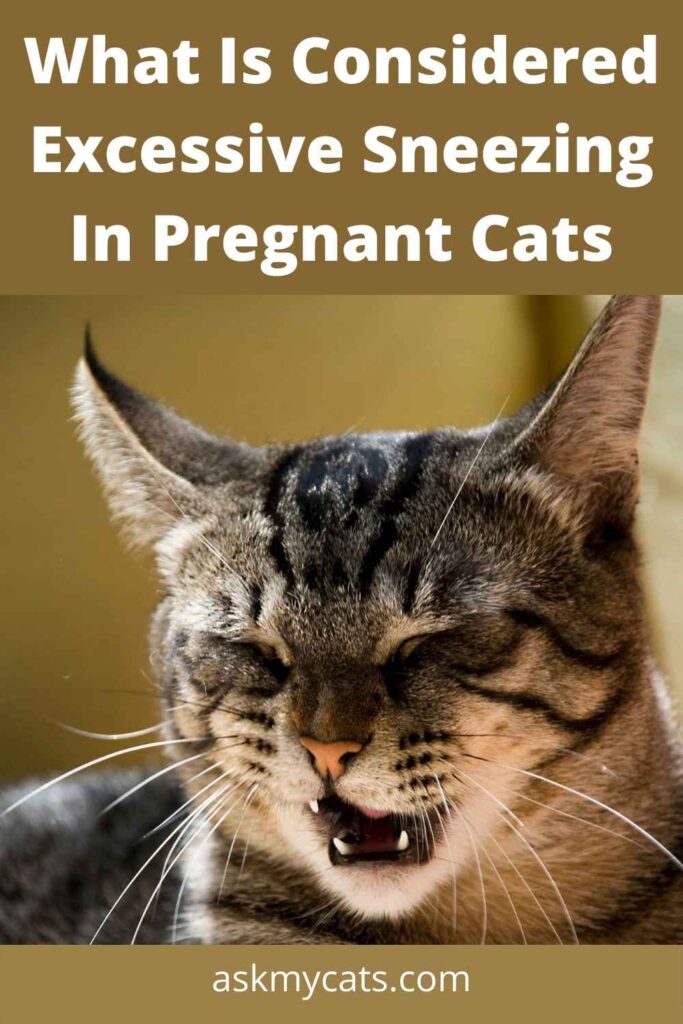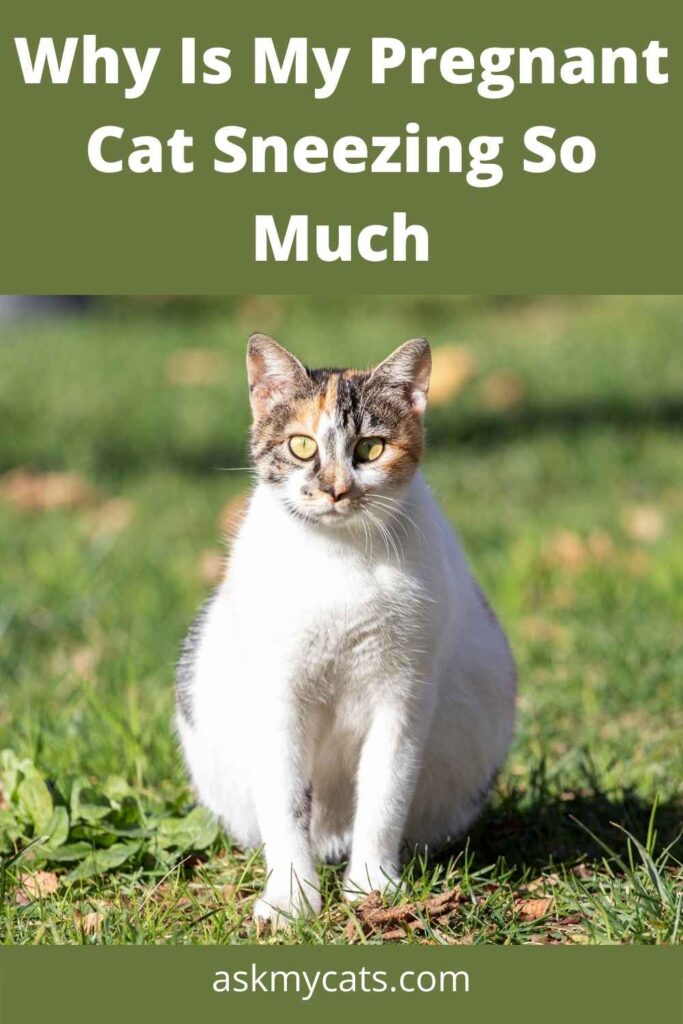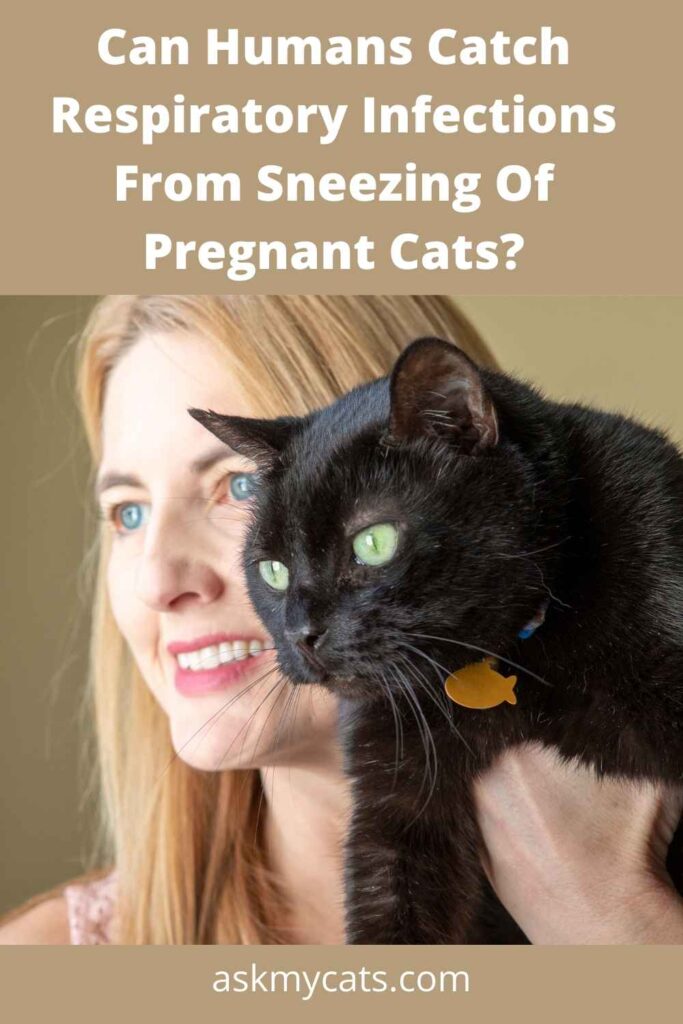Imagine this: Your pregnant cat gets up next to you as you sit on the couch and start watching TV. As you begin to pet her, she suddenly lets out a loud sneeze. Since cat sneezes are cute, you don’t think anything of it and carry on with your day.
Then, though, that one sneeze multiplies into two, and those two sneezes become a never-ending sneeze fest. After so many sneezes, adorable turns into unsettling.
This article will cover a variety of topics, including the reasons why pregnant cats sneeze, home cures for sneezing, when you should take your pet to the doctor, and more.
You wouldn’t want to sneeze and go undetected if you were ill. Your cat is also deserving of the same!


Give Your Cat the Perfect Day
Get the Free Ebook!
Do Pregnant Cat Sneeze A Lot
Sneezing is not a sign of pregnancy in cats. The body’s reaction to irritants in the nasal passages often causes cats to sneeze, which is an explosive burst of air from the nose and mouth. Sneezing in cats can occasionally be brought on by excitement or activity.
We understand that taking care of your feline when she is in labor is your priority and hypes worrying but something as simple as sneezing has little to nothing to do with her or her baby’s health, so you need not worry, it is completely normal for them to be sneezing just like you!
Despite this, if you discover that your pregnant cat is sneezing frequently, she may require veterinarian care.
Although they can be caused by other conditions as mentioned above such as coughing and sneezing which are frequently symptoms of upper respiratory infections.
Your cat will recover quickly with some supportive care at home and assistance from your veterinarian.
What Is Considered Excessive Sneezing In Pregnant Cats
Cats occasionally sneezing is common and not very concerning. However, you may need to consult your veterinarian to determine whether therapy is necessary if your cat’s sneeze doesn’t stop or if other symptoms have appeared along with it.

Although sneezing in a pregnant cat is not very worrisome, it needs to be taken into serious consideration if she has recently started exhibiting some of the following symptoms;
Upper respiratory tract infections can cause clear or colored discharge from the eyes or nose, coughing, sneezing, conjunctivitis, mouth ulcers, drowsiness, and anorexia, among other symptoms. Cats may occasionally struggle to breathe and gasp for air.
Lethargy, anorexia, fast or difficult breathing, and coughing are all possible symptoms of lower respiratory tract infections (which should not exceed 35 breaths per minute at rest).
Pregnant cats frequently have respiratory illnesses, especially in areas with high densities like shelters, breeding facilities, and wild cat colonies.
These infections, which have a detrimental effect on feline health, are brought on by a range of viruses, bacteria, fungus, and protozoa.
While immunizations have significantly decreased the prevalence of severe respiratory illness in cats, they have not completely eradicated the microorganisms that are responsible for it.
Both the upper and lower parts of the respiratory system are susceptible to infection.
Why Is My Pregnant Cat Sneezing So Much
The small “ah-choo” sound and the way your pregnant cat’s face scrunches up after sneezing is lovely. But as the coughs and sneezes mount, you begin to wonder: Does my cat need to visit the doctor?

Several things can cause cats to sneeze, including being pregnant. They typically sneeze for the following reasons:
- Unpleasant or offensive odors, such as those from cleaning supplies or preparing spicy meals
- Airborne irritants, including dust, pollen, perfume, dirty cat litter, and cigarette smoke
- Upper respiratory illnesses
- Sinusitis or nasal cavity inflammation
- Object foreign to the nasal passageways, like a blade of grass or feather
- Excitement
- Asthma or allergic rhinitis (more common in adult cats)
- Sinuses can become inflamed and swollen as a result of dental issues (more common in adult cats)
But do not worry even though the list feels everlasting, and you are now feeling overwhelmed as to how you can find the real culprit of the situation.
It is fairly easy to determine what makes your kitten sneeze, or when your doctor may be needed. When your feline sneezes, think about the surroundings:
Have you been catching up on dusting, or did a family member just spray Lysol? In these instances, the sneeze was probably merely brought on by a slight tickle to your pregnant cat’s nasal passages. Once the air is cleared, the sniffling should cease immediately.
If the sneeze continues, there is likely a more complicated issue at hand. Think about whether she sneezes consistently or if there is a pattern to the time of day or persons who are nearby (such as a person who smokes or wears a lot of scents).
However, if these are the symptoms they are projecting then she most likely has an infection of the upper respiratory tract.
There may be more sneeze reasons :
Pregnant cats may sneeze due to several other circumstances. For instance, it’s typical for cats to sneeze four to seven days after having an intranasal vaccination.
This sneeze only lasts for a few days at most, so be a little observant if your cat is in labor and has recently gone through a vaccination.
In an effort to clear a blockage in their nasal passages, she may also sneeze. Sneezing and sinus leakage can both result from an infection or inflammation of a tooth root.
Sneezing in cats can, in extremely rare instances, be an indication of malignancy.
You might also like to know about why does my cat huff
Can Humans Catch Respiratory Infections From Sneezing Of Pregnant Cats?
Cats can help their owners feel better emotionally, lift their spirits, and generally make them feel better, according to research. Cats are also attributed to helping senior citizens socialize.

Despite the fact that cats are wonderful pets, owners of cats should be aware that occasionally cats due to the body’s susceptibility, pregnant cats may carry viruses that can cause a range of ailments in humans, from mild skin infections to major respiratory illnesses.
Although not every sneeze and every cough has to be noted and stayed away from there are good chances of it being a friendly “aan-choo”, but cats are given she has serious respiratory problems then as a caregiver you need to be cautious, but please do not leave her on own terms, especially now when she in labor.
Are you or your loved ones in danger?
The majority of infectious illnesses that result in upper respiratory infections in pregnant cats are extremely species-specific and pose little risk to humans.
In some cases, Bordetella bronchiseptica can make persons with immune system disorders sick. There have been a few sporadic cases of persons who share a home with an afflicted cat getting conjunctivitis. ( Please contact your Vet to understand it better )
Maintain excellent cleanliness to reduce the risk of infection, and it would be wise to see a doctor if anybody in your home starts to have sore or runny eyes or other symptoms of a respiratory infection while your cat is sick.
Thankfully, these zoonotic illnesses are quite uncommon.
Let us now understand one of your major concerns if your pregnant cat has some respiratory infections :
Feline Upper Respiratory Infection
The phrase “feline upper respiratory infection” (URI) refers to a respiratory illness in cats brought on by one or more bacterial or viral causes.
This disorder is also known as feline upper respiratory disease complex and feline infectious respiratory disease (URD). One or more bacterial and viral agents that may sicken cats may be to blame for the sickness.
NOTE: To reduce the chance of spreading any contagious diseases, it is best to keep a new cat separate from the existing cats in your home for at least 1-2 weeks. A vet should check the cat at this period to make sure it is okay for the cats to interact.
What Should You Do If Your Pregnant Cat Sneezing A Lot?
If your pregnant cat sneezes frequently or constantly, sneezes blood, or exhibits any of the other symptoms mentioned above, be sure to call the vet. They could indicate a disease or condition that requires veterinarian treatment.
Treatment is based on the sneezing’s underlying cause. In minor situations, your veterinarian could advise adopting simple comfort measures for your pregnant cat, such as using a humidifier.
In other circumstances, fluids, steroids, antihistamines, or antibiotics may be required. Pregnant cats/cats in general, who don’t react to medicinal treatment may occasionally need surgery.
Home Remedies To Treat Sneezing In Pregnant Cats
To make your pregnant cat’s life more comfortable and reduce her sneezing, there are several therapeutic alternatives available.
Although antibiotics can help your cat in labor feel better fast, you can also try some additional at-home comforting techniques.
Get rid of scented items like air fresheners: A cat in labor may experience watery eyes and nose after inhaling potent aromas from air fresheners or other scented goods, and this might even result in respiratory problems.
Avoid hazardous cleaning products: which can be harmful to pregnant cats if breathed or consumed. This includes many common home cleansers.
Vaporizers: Sneezing and stuffiness in pregnant cats can be brought on by a dry atmosphere, thus vaporizing can assist to reduce these symptoms.
Feed your pregnant cat enticing-smelling food: healthy cats naturally have the ability to fight off diseases.
And she must eat to stay healthy. Your cat in labor may be less likely to eat if they can’t smell, which will just make the issue worse. You may even consider reheating their meal to intensify the odor.
By making little changes in your environment, you may stop her from sneezing in several different ways.
Check for dust that may be aggravating their allergies and stop using air fresheners, perfumes, and scented laundry detergents to see if it helps. Use a low-dust litter box to further reduce the amount of dust in your cat’s habitat.
In addition to keeping your house clean, do your best to keep your pregnant cat in a low-stress setting to avoid herpes flare-ups, which can be aggravated by stress.
Frequently Asked Questions
Should I take my cat to the vet if she is sneezing?
A trip to the veterinarian is probably required for a correct diagnosis and treatment if the sneeze continues or is accompanied by other symptoms. If your cat has stopped eating, this is very crucial.
How much sneezing is too much for a cat?
Sneezing is common if it happens occasionally, just like it is in humans and other animals. Even the occasional sneeze episode in a cat is common. However, over several days in a row, a cat sneezing multiple times per day is not typical.
What can I give my cat to stop her from sneezing?
The use of medicines like doxycycline or azithromycin will significantly lessen sneezing and other symptoms, allowing your cat to breathe more easily, even if these infections are rarely the only problem.
Final Words
Sneezing frequently when pregnant may be a sign of a more serious underlying medical condition.
We’ve compiled vital details about the causes of sneezing in cats and several treatment options to assist you to understand why your cat in labor is sneezing and how you can help them.
It’s crucial to take the required actions to aid your cat’s recovery, whether you can do it yourself or with a veterinarian’s guidance.
We hoped that we could provide you with some comfort during your difficult time and help you choose some options for caring for your pregnant cat and assisting her in becoming a mother.
References
- https://naldc.nal.usda.gov/download/IND85005532/PDF
- https://vcahospitals.com/know-your-pet/feline-upper-respiratory-infection
